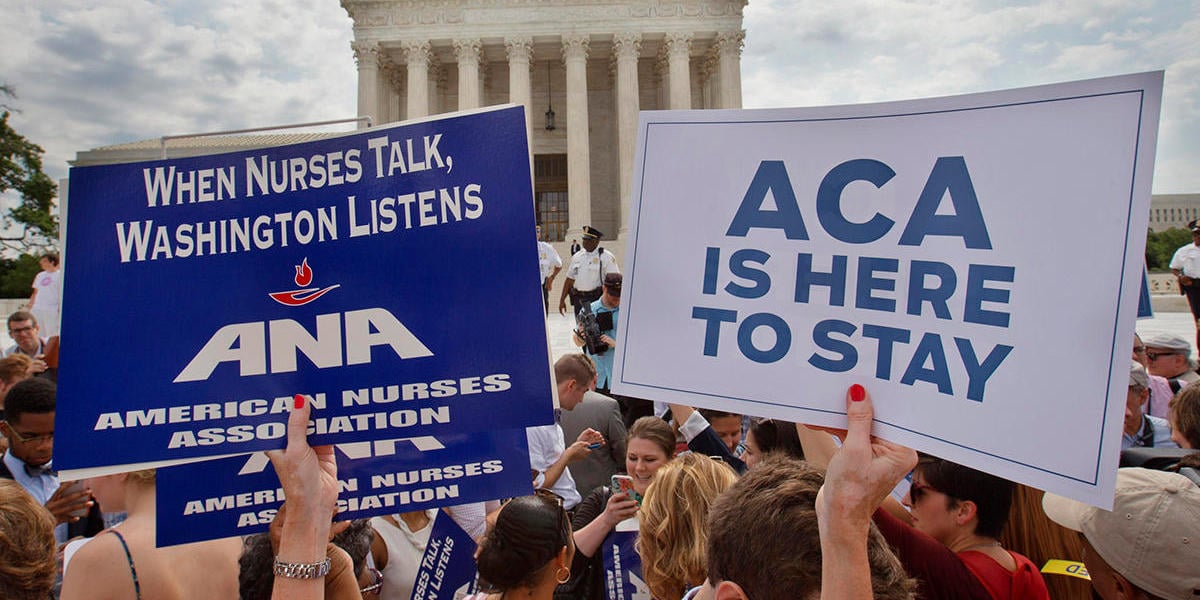2016 Election Could Decide Obamacare’s Fate In Georgia

On a recent campaign stop in Cobb County, Republican vice presidential nominee Mike Pence made a promise that used to be a big applause line at Republican rallies since the passage of the Affordable Care Act, or Obamacare.
“If you want a president who will cut taxes, grow our economy, squeeze every nickel out of that bloated federal bureaucracy and repeal Obamacare lock stock and barrel,” Pence said to growing applause, “then I say to you here in Georgia, we have but one choice.”
The promise to repeal the ACA came more than half hour into Pence’s speech and was the only mention of the president’s signature health care law, while just years ago, the Republican Party built entire campaigns on repealing it.
Now, with the presidential election less than two month away, the ACA has taken a backseat to other issues on the campaign trail, like immigration and national security. But the election’s outcome will likely have a huge impact on the law’s future, and whether states like Georgia drop their longstanding opposition to some of its policies.
Republican Donald Trump is calling for its repeal. Democrat Hillary Clinton wants to expand it.
“The election is going to settle that uncertainty on what is going to be the likely fate of the Affordable Care Act,” says Bill Custer, a health care expert at Georgia State University’s Robinson College of Business.
Medicaid Expansion
One of the central tenets of the president’s health law is expanding Medicaid to those whose income falls at or below 138 percent of the federal poverty line, or $16,243 a year.
Georgia and 18 other states have so far refused to expand Medicaid, after the U.S. Supreme Court said states had the option. As many as a 500,000 people could qualify for coverage under Medicaid expansion in Georgia, which has one of the highest uninsured rates in the country.
Custer says with a Clinton win, states will have a harder time fighting expansion.
“If Hillary Clinton wins, it’s pretty much going to be the status quo,” Custer says. “There certainly will be some changes to the Affordable Care Act, but it’s very much going to be fine tuning.”
A Fiscal Cliff For Hospitals
Joan Alker, executive director of the Georgetown University Center for Children and Families, agrees with Custer. She says states that haven’t expanded Medicaid continue to see much higher rates of uninsured people.
Alker says without expansion, some hospitals in non-expansion states like Georgia are facing a financial cliff.
“The Affordable Care Act assumed that all states would do Medicaid expansion,” Alker says. “So now we have states where we will see cuts for uncompensated care for hospitals. Yet they haven’t picked up the Medicaid expansion so they still have uninsured people.”
Hospitals that serve a lot of poor and uninsured patients, such as rural or safety-net hospitals like Grady Memorial, get extra money from the federal government, called Disproportionate Share Hospital Payments.
Last year, Georgia got about $291 million from this payment system, according to the Kaiser Family Foundation. But the ACA calls for phasing out these payouts, with a $2 billion cut expected in fiscal year 2018.
Five hospitals in Georgia have closed since 2013, and about 40 percent of them were operating in the red as of 2014, according to the Georgia Hospital Association. The planned cuts, which extend through 2025, could force more to shut their doors.
This reality has some state Republicans saying it’s time to end the longstanding opposition to expanding Medicaid, because with it, the state could pull down billions in federal dollars.
“I think it’s our fiduciary responsibility to leave that tool box open,” says State Senator Renee Unterman, R-Buford, who’s been leading the tepid conversation about Medicaid expansion.
Expansion here could have drawn down $33 billion in federal funding from 2013 to 2022, according to a report from the Urban Institute, with nearly $13 billion going directly to hospital reimbursements. The cost to the state, the report says, would be about $2.5 billion.
Fueling the discussion is a new report from the state Chamber of Commerce. It outlines three ways to put more Georgians on Medicaid, though none call for a traditional expansion as outlined under the ACA
Blake Fulenwider, who helped work on the proposal, says after the election, Georgia will able to negotiate a more conservative plan.
“We’re going to be dealing with a different administration, and these are the types of things that can change,” Fulenwider says. “This may be one of those issues that the administration may be willing to compromise on.”
A Trump Victory
With Trump’s promise to repeal the Affordable Care Act, Medicaid expansion might not even be an option.
Custer, of Georgia State, says while a wholesale repeal could put an end to those impending hospital cuts, “there will be an increase in the number of Americans and Georgians without health insurance.”
An analysis by the nonpartisan Center for Health and Economy found that under Trump’s plan, 18 million fewer people nationally would have coverage, primarily among the Medicaid population. But the report also says his plan could make private health insurance coverage more affordable for some people.
Georgetown’s Joan Alker says it’s hard to predict what could happen.
“A lot of uncertainty at best, and potentially a lot of chaos as potentially millions of people become uninsured,” Alker says.
Such a full-scale repeal, though, will require full republican control of the House and Senate as well, and the Senate is also at play this election.
Any expansion plan is also likely to face stiff opposition in the state legislature, should it make it to the state Capitol next year.








